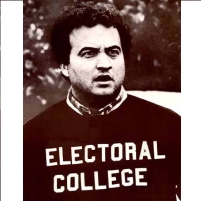Americans Overwhelmingly Want to End Electoral College
Thursday, October 27, 2011

Americans have had nearly 11 years to think it over and they’re still of the opinion that the Electoral College needs to go.
Following the deadlocked 2000 presidential contest, voters learned all about the Electoral College’s role in electing a president. And after the U.S. Supreme Court ruled in favor of George W. Bush, essentially giving him the election even though he earned fewer votes than Al Gore, 61% of respondents to a Gallup poll then said they favored electing presidents by popular vote, while only 35% still wanted the Electoral College.
A new poll virtually mirrors the 2000 survey, with 62% favoring the popular vote.
This time, though, the results aren’t as driven by partisanship. In December 2000, the favoritism for the popular vote was led by Democrats, 75% of whom liked this idea, while 56% of Republicans wanted to keep the Electoral College.
Now, 53% of GOP voters want the popular vote to decide who controls the White House. Seventy-one percent of Democrats are on their side.
Gallup first began asking questions relating to popular vote vs. Electoral College back in 1967, yet not once has a majority of respondents polled in favor of the current system.
There are several good reasons why the majority of Americans want to get rid of the Electoral College.
· The first is a simple one: one candidate can win the most votes and the losing candidate wins the election. Although the Bush-Gore controversy of 2000 is the most well-known, it was actually the fourth U.S. presidential election in which the loser won. In 1824, Andrew Jackson outpolled John Quincy Adams by a hefty 12.6%...but Quincy Adams won the presidency. In 1876, Samuel Tilden gained a majority of the popular vote, but Rutherford B. Hayes won the election. And in 1888, Grover Cleveland outpolled Benjamin Harrison, but Harrison ended up in the White House.
· It warps the vote in an undemocratic manner. The nine most populous states in the country—California, Texas, New York, Florida, Illinois, Pennsylvania, Ohio, Michigan and Georgia—account for more than half of the nation’s population, but only have 241 electoral votes. The other 41 states contain less than half of the population, but have 291 electoral votes. (Another 3 go to Washington D.C.)
· Unless there is a landslide, about two-thirds of the states are not in play because they are safely Democratic or safely Republican. Both presidential candidates skew their campaigning to the issues and positions they think are popular among the undecided portion of the voting population of the other 14 or 15 states, virtually ignoring issues of specific importance to the states that are not in play. In 2004, for example, the George W. Bush and John Kerry campaigns ran 8,252 TV ads in Nevada, a state with a population of 2.3 million, and none in neighboring California, with a population of 35.9 million. If U.S. presidential elections were decided by popular, each person’s vote would be equal, no matter where they lived.
-David Wallechinsky, Noel Brinkerhoff
Americans Would Swap Electoral College for Popular Vote (by Lydia Saad, Gallup)
Is the Electoral College Distorting Obama Policy? (by Noel Brinkerhoff, AllGov)
- Top Stories
- Unusual News
- Where is the Money Going?
- Controversies
- U.S. and the World
- Appointments and Resignations
- Latest News
- Trump to Stop Deportations If…
- Trump Denounces World Series
- What If China Invaded the United States?
- Donald Trump Has a Mental Health Problem and It Has a Name
- Trump Goes on Renaming Frenzy






Comments